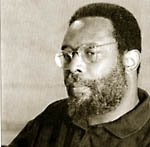My work is rooted in the traditions of pre-colonial Africa and ancient Egypt rather than the Greco Roman art of the west. Coming to the visual arts late in life I deliberately chose not to be trained in western art institutions as I felt that these institutions could not teach me what I wanted to know. They were too deeply entrenched in their own traditions with little or no understanding or interest in the things that interested me most, which are the ideas that lie behind the art and culture of Africa.
As an African, born in the Caribbean who was completely cut off from any knowledge of my ancestral home, and completely dominated by western culture, it was important to get some understanding of my ancestral home, and that art was the most accessible way of doing that. Africa and things African was something dark and hidden, something to be feared and avoided at all cost.
I decided to become an artist while on a visit to Benin Nigeria, in the mid 1970s. I had travelled to Nigeria as a musician where I experienced some kind of spiritual transformation or enlightenment. I returned to London determined to acquire knowledge of the technique of sculpting, which I was able to find in books and through trial and error.
The philosophical aspect came through a deep intuition and travels through various parts of Africa, exploring the spiritual side of my ancestral/ spiritual home; this was my art school, my university. The intuitive/spiritual aspect of reality still abounds in Africa. I believe that what is described as African art is not art in the western sense but creations associated with religion, magic and ritual.
And so the creation of art for me is a colossal struggle with the following:
* Is there a role for art in the traditional sense in our lives today
* Is the purpose of art to intercede between us and the forces of modern civilization
* Is there a special need for art in the lives of contemporary African peoples
* Is there a need for magic and rituals that mediate between that which we have lost and that which we have become
* What should be the nature of the battle against the negative effects of modern life upon the delicate nature of our ancestral psyche?
The encounter between the African and the European has brought about deep rooted spiritual and mental conflicts at the core of the African, along with the belief that the African is nothing more than “the reflection of a primitive and barbarous mentality.” I believe that this point of view cannot be left unchallenged, and that art has an important role to play in the struggle to define and redefine a contemporary African world-view.
He who defines “the story” is he who controls, and so we are engaged in a struggle to define for ourselves, thereby becoming masters of our own destiny.
The role of African artists today is to begin the process of developing a language that enables us to communicate across ethnic, tribal, national and geographical boundaries; however, we should use the elements of the various ethnic, tribal and national groups to achieve this end. But before we can begin that process, it is necessary for us to acquire a greater understanding of our traditional art forms and cultures, specifically its purpose within our ancestral societies.
Within most traditional African societies there was no such thing as “art for art’s sake”. Art was an integral part of the life of the community; it was not separate nor was it solely the artist’s prerogative to express his personal desires and inclinations.
Art was the means by which sacred history served the function of revealing those invisible dimensions that gave support to transcendent ideals. For without sacred history, self would have no relationship to family, family would have no relationship to community; community no relationship to world, and world no relationship to Creation.
Those traditions are not dead, buried and inert, unchanging things waiting to be rediscovered. They are living entities which must be constantly renewed, to enable us to make ourselves anew, new Africans in a contemporary post modernist world.
In today’s African artists’ work we must see the eyes and hands of the contemporary artist, looking anew, not at, but through the prism of an African aesthetic, speaking in a new world with the voices of the ancestors; voices for so long silenced; in doing so, their art will offer new generations the opportunity to look again with fresh eyes, to see themselves in new ways.

No comments:
Post a Comment